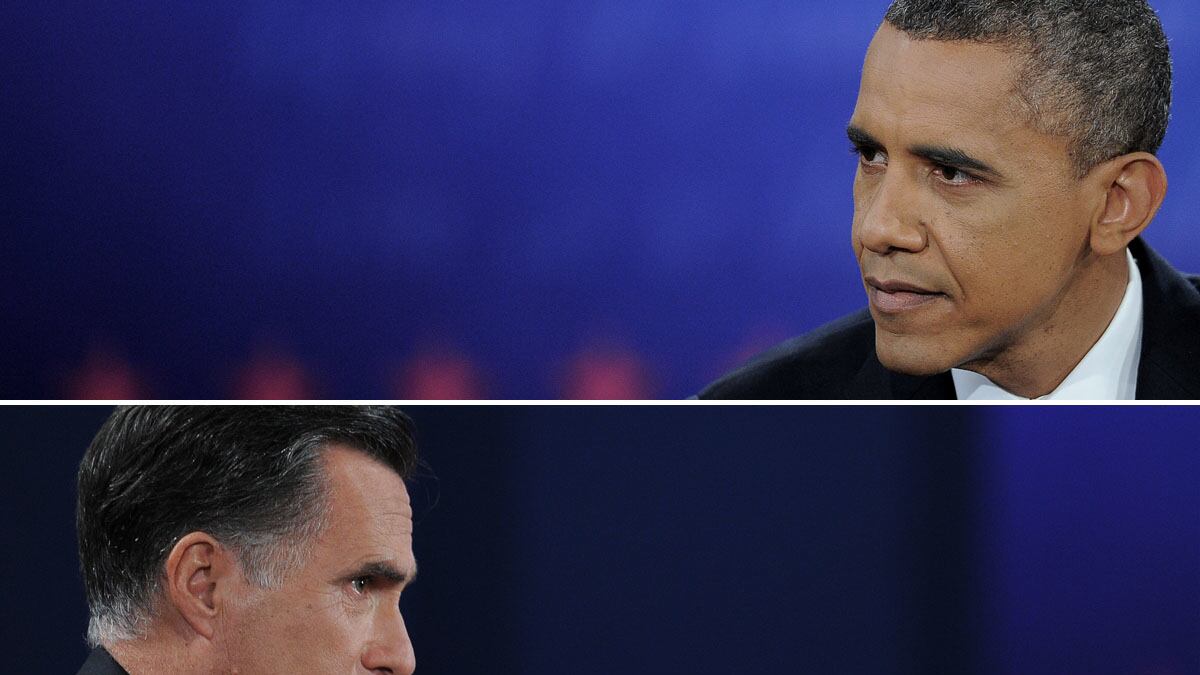Romney: “Obama started his presidency with an apology tour.”

This was certainly not the first lie of the night, but the “apology tour” line deserves to be addressed right off the bat since it has been a consistent claim of Romney’s throughout his entire campaign. The roots of this statement, which Mitt made during his Republican National Convention acceptance speech, to which Paul Ryan referred in the vice-presidential debate, and which Mitt mentioned again in the second presidential debate last week, go back to his 2010 book, No Apology. The Republican presidential hopeful writes that, “in his first nine months in office, President Obama has issued apologies and criticisms of America in speeches in France, England, Turkey, and Cairo; at the CIA headquarters in Langley, Virginia, the National Archives in Washington, D.C., and the United Nations in New York City.”
Fact-checkers at Politifact, the Washington Post, and FactCheck.org have gone over those speeches Romney refers to and have concluded, time and again, that President Obama made no apologies for the United States. While the president may have acknowledged American shortcomings and attempted to distance himself from the policies of his predecessor, such as when he noted, in Strasbourg, France, in 2009, an American “failure to appreciate Europe’s leading role in the world” and that “there have been times where America has shown arrogance and been dismissive, even derisive,” not once did he apologize.
Romney: “Republicans and Democrats came together on a bipartisan basis” to make Massachusetts grade-school test scores the highest in the nation.
Obama: “But that was 10 years before you took office.”
New York Times fact-checker Richard Perez-Pena notes that both Obama and Romney—though diverging from the debate’s foreign-policy theme—are correct here. According to the National Assessment of Educational Progress, Massachusetts’ schools did become No. 1 in the U.S. in 2003, right after Romney became governor, but, as Obama noted, that success has largely been attributed to a law passed in 1993 by Republican Gov. William Weld.
Obama: “Governor Romney, I’m glad that you recognize that al Qaeda is a threat, because a few months ago when you were asked what’s the biggest geopolitical threat facing America, you said Russia, not al Qaeda. You said Russia ... the 1980s, they’re now calling to ask for their foreign policy back because, you know, the Cold War’s been over for 20 years.”
Romney countered that Obama was taking his words out of context, that he really thinks “the greatest threat the world faces is a nuclear-armed Iran.”
This one is a little tough to mediate. Back in March, Romney told CNN’s Wolf Blitzer that Russia “is without question our No. 1 geopolitical foe. They fight for every cause for the world’s worst actors.” In a July interview, the Republican backed up his initial statement to Blitzer, clarifying that he was referring to the country’s “votes at the United Nations and actions of a geopolitical nature—Russia is the No. 1 adversary in that regard. That doesn’t make them an enemy. The No. 1 national-security threat, of course, to our nation is a nuclear Iran.”
So, Romney is technically right here. There is a difference, as he has already clarified, between “foe” and “threat,” making Obama’s “the 1980s called and they want their foreign policy back” line more clever than it is credible.
Romney: Syria is Iran’s only ally in the Arab world. It’s their route to the sea.”
A quick glance at a map of the Middle East easily throws out this claim. Perhaps Romney was referring specifically to the Mediterranean Sea, but he certainly didn’t say so. Syria and Iran are allies, that part is true, but a large part of Iran’s sovereign border is coastline that moves from the Persian Gulf to the Gulf of Oman and into the Arabian Sea, which, The New York Times’ Thom Shanker points out, “leads into the Indian Ocean and onward to the world’s high seas.”
Obama: “You initially opposed a timetable in Afghanistan, now you’re for it, although it depends.”
The president’s attempt to call Romney out on flip-flopping here mostly falls flat. In June 2011, Romney did criticize the Obama administration for announcing the pullout date, arguing that “the Taliban may not have watches, but they do have calendars.” Still, as early as November 2011, the Republican presidential hopeful declared his support for the plan, saying, “The timetable by the end of 2014 is the right timetable for us to be completely withdrawn from Afghanistan, other than a small footprint of support forces.” In saying, “although it depends,” Obama is pointing to Romney’s caveat placement in a recent veterans-convention speech—that, if president, he “will evaluate conditions on the ground and solicit the best advice of our military commanders.” The Obama administration—including Joe Biden in the recent vice-presidential debate—has reiterated that the 2014 withdrawal is unconditional; however the plan does include leaving 10,000 to 15,000 troops on the ground post-withdrawal if the Afghan government agrees. The point is, Romney’s disagreement with the Obama on the withdrawal from Afghanistan was with regard to the administration’s announcement of it, not the timetable.
Romney: “Iran is four years closer to a nuclear weapon.”
The New York Times notes that achieving a nuclear weapon would require Iran to further enrich the low- and medium-enriched uranium it already has on hand—a process that would be hard to hide from the international weapons inspectors who visit the country’s enrichment facilities several times a month. If Tehran is able to create bomb-grade uranium under international inspectors’ noses, it would then have to fashion it into a bomb—something American officials have agreed is possible but, again, hard to keep secret—and finally make that weapon, once developed, small enough to fit atop Iran’s longest-range missile. U.S. intelligence officials insist it’s extremely unlikely the country’s nuclear-weapons program could advance this far without being caught, but, the Times argues, “that does not guarantee they could be stopped: The United States saw China, India, Pakistan, and North Korea becoming nuclear powers, and decided in each case that it was not worth a war to stop them.”
Obama: “You mention the Navy, for example, and the fact that we have fewer ships than we did in 1916. Well governor, we also have fewer horses and bayonets because the nature of our military has changed.”
Romney’s argument that the Navy is the smallest it’s been since the beginning of the 20th century was deemed “Pants-on Fire” false by Politifact after he first made it back in January, but it was the quip about bayonets and horses that Obama used to dismiss Romney’s claim that really went viral.
While Obama’s snarky remark echoed the sentiment shared by fact-checkers that Romney’s naval concerns are nonsensical, how does the president’s own statement hold up? Are bayonets really as obsolete as cavalry horses? The U.S. military definitely doesn’t use as many bayonets as it did in 1916, that’s for sure, but while the Army hasn’t included bayonet instruction in its basic training since 2010, the Washington Post notes that, “U.S. Marines still train on bayonets in boot camp” and “many Marines are still issued bayonets as standard equipment.”






